 Libri di Ian Scoones su Unilibro.it
)
Libri di Ian Scoones su Unilibro.it
)
|
|
2021 |
 Title :
Sussistenza sostenibile e sviluppo rurale
Title :
Sussistenza sostenibile e sviluppo ruraleAuthor: Scoones Ian Publisher: Rosenberg & Sellier Il messaggio di Sussistenza sostenibile e sviluppo rurale è chiaro: gli approcci della sussistenza ci forniscono una lente essenziale attraverso cui leggere le questioni inerenti allo sviluppo rurale, ma tali questioni devono comunque essere affrontate partendo da una adeguata comprensione dell'economia politica. Ian Scoones scava a fondo nella storia degli studi sulla sussistenza, riflette sulle connessioni tra questi e gli studi sulla povertà e sul benessere ed analizza i diversi modelli della sussistenza, mettendone in luce potenzialità e limiti.'Questo libro attinge alle prospettive adottate in varie discipline combinandole tra loro. € 15,00
Scontato: € 14,25
|
|
|
1917 |
 Title :
Global Land Grabbing and Political Reactions from Below
Title :
Global Land Grabbing and Political Reactions from BelowAuthor: Edelman Marc (EDT), Hall Ruth (EDT), Borras Saturnino M. Jr. (EDT), Scoones Ian (EDT), White Ben (EDT) Publisher: Routledge € 154,00
|
|
|
1915 |
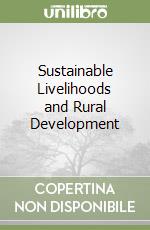 Title :
Sustainable Livelihoods and Rural Development
Title :
Sustainable Livelihoods and Rural DevelopmentAuthor: Scoones Ian Publisher: Fernwood Books Ltd € 17,10
|
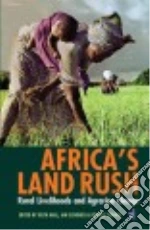 Title :
Africa's Land Rush
Title :
Africa's Land RushAuthor: Hall Ruth (EDT), Scoones Ian (EDT), Tsikata Dzodzi (EDT) Publisher: James Currey Ltd € 16,80
|
 Title :
Carbon Conflicts and Forest Landscapes in Africa
Title :
Carbon Conflicts and Forest Landscapes in AfricaAuthor: Leach Melissa (EDT), Scoones Ian (EDT) Publisher: Routledge Amidst the pressing challenges of global climate change, the last decade has seen a wave of forest carbon projects across the world, designed to conserve and enhance forest carbon stocks in order to reduce carbon emissions from deforestation and offset emissions elsewhere. Exploring a set of new empirical case studies, Carbon Conflicts and Forest Landscapes in Africa examines how these projects are unfolding, their effects, and who is gaining and losing. Situating forest carbon approaches as part of more general moves to address environmental problems by attaching market values to nature and ecosystems, it examines how new projects interact with forest landscapes and their longer histories of intervention. The book asks: what difference does carbon make? What political and ecological dynamics are unleashed by these new commodified, marketized approaches, and how are local forest users experiencing and responding to them? The book’s case studies cover a wide range of African ecologies, project types and national political-economic contexts. By examining these cases in a comparative framework and within an understanding of the national, regional and global institutional arrangements shaping forest carbon commoditisation, the book provides a rich and compelling account of how and why carbon conflicts are emerging, and how they might be avoided in future. This book will be of interest to students of development studies, environmental sciences, geography, economics, development studies and anthropology, as well as practitioners and policy makers. € 45,80
|
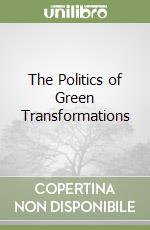 Title :
The Politics of Green Transformations
Title :
The Politics of Green TransformationsAuthor: Scoones Ian (EDT), Leach Melissa (EDT), Newell Peter (EDT) Publisher: Routledge Multiple ‘green transformations’ are required if humanity is to live sustainably on planet Earth. Recalling past transformations, this book examines what makes the current challenge different, and especially urgent. It examines how green transformations must take place in the context of the particular moments of capitalist development, and in relation to particular alliances. The role of the state is emphasised, both in terms of the type of incentives required to make green transformations politically feasible and the way states must take a developmental role in financing innovation and technology for green transformations. The book also highlights the role of citizens, as innovators, entrepreneurs, green consumers and members of social movements. Green transformations must be both ‘top-down’, involving elite alliances between states and business, but also ‘bottom up’, pushed by grassroots innovators and entrepreneurs, and part of wider mobilisations among civil society. The chapters in the book draw on international examples to emphasise how contexts matter in shaping pathways to sustainability Written by experts in the field, this book will be of great interest to researchers and students in environmental studies, international relations, political science, development studies, geography and anthropology, as well as policymakers and practitioners concerned with sustainability.
€ 149,60
|
 Title :
The Politics of Green Transformations
Title :
The Politics of Green TransformationsAuthor: Scoones Ian (EDT), Leach Melissa (EDT), Newell Peter (EDT) Publisher: Routledge Multiple ‘green transformations’ are required if humanity is to live sustainably on planet Earth. Recalling past transformations, this book examines what makes the current challenge different, and especially urgent. It examines how green transformations must take place in the context of the particular moments of capitalist development, and in relation to particular alliances. The role of the state is emphasised, both in terms of the type of incentives required to make green transformations politically feasible and the way states must take a developmental role in financing innovation and technology for green transformations. The book also highlights the role of citizens, as innovators, entrepreneurs, green consumers and members of social movements. Green transformations must be both ‘top-down’, involving elite alliances between states and business, but also ‘bottom up’, pushed by grassroots innovators and entrepreneurs, and part of wider mobilisations among civil society. The chapters in the book draw on international examples to emphasise how contexts matter in shaping pathways to sustainability Written by experts in the field, this book will be of great interest to researchers and students in environmental studies, international relations, political science, development studies, geography and anthropology, as well as policymakers and practitioners concerned with sustainability.
€ 45,80
|
|
|
1914 |
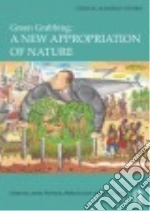 Title :
Green Grabbing
Title :
Green GrabbingAuthor: Fairhead James (EDT), Leach Melissa (EDT), Scoones Ian (EDT) Publisher: Routledge Across the world, ecosystems are for sale. ‘Green grabbing’ – the appropriation of land and resources for environmental ends – is an emerging process of deep and growing significance. A vigorous debate on ‘land grabbing’ already highlights instances where ‘green’ credentials are called upon to justify appropriations of land for food or fuel. Yet in other cases, environmental green agendas are the core drivers and goals of grabs. Green grabs may be drivn by biodiversity conservation, biocarbon sequestration, biofuels, ecosystem services or ecotourism, for example. In some cases theyse agendas involve the wholesale alienation of land, and in others the restructuring of rules and authority in the access, use and management of resources that may have profoundly alienating effects. Green grabbing builds on well-known histories of colonial and neo-colonial resource alienation in the name of the environment. Yet it involves novel forms of valuation, commodification and markets for pieces and aspects of nature, and an extraordinary new range of actors and alliances. This book draws together seventeen original cases from African, Asian and Latin American settings to ask: To what extent and in what ways do ‘green grabs’ constitute new forms of appropriation of nature? What political and discursive dynamics underpin ‘green grabs’? How and when do appropriations on the ground emerge out of circulations of green capital? What are the implications for ecologies, landscapes and livelihoods? Who is gaining and who is losing? How are agrarian social relations, rights and authority being restructured, and in whose interests? This book was published as a special issue of the Journal of Peasant Studies. € 56,10
|
|
|
1913 |
 Title :
Green Grabbing
Title :
Green GrabbingAuthor: Fairhead James (EDT), Leach Melissa (EDT), Scoones Ian (EDT) Publisher: Routledge € 192,50
|
|
|
1912 |
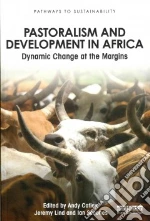 Title :
Pastoralism and Development in Africa
Title :
Pastoralism and Development in AfricaAuthor: Catley Andy (EDT), Lind Jeremy (EDT), Scoones Ian (EDT) Publisher: Taylor & Francis Once again, the Horn of Africa has been in the headlines. And once again the news has been bad: drought, famine, conflict, hunger, suffering and death. The finger of blame has been pointed in numerous directions: to the changing climate, to environmental degradation, to overpopulation, to geopolitics and conflict, to aid agency failures, and more. But it is not all disaster and catastrophe. Many successful development efforts at ‘the margins’ often remain hidden, informal, sometimes illegal; and rarely in line with standard development prescriptions. If we shift our gaze from the capital cities to the regional centres and their hinterlands, then a very different perspective emerges. These are the places where pastoralists live. They have for centuries struggled with drought, conflict and famine. They are resourceful, entrepreneurial and innovative peoples. Yet they have been ignored and marginalised by the states that control their territory and the development agencies who are supposed to help them. This book argues that, while we should not ignore the profound difficulties of creating secure livelihoods in the Greater Horn of Africa, there is much to be learned from development successes, large and small. This book will be of great interest to students and scholars with an interest in development studies and human geography, with a particular emphasis on Africa. It will also appeal to development policy-makers and practitioners. € 52,40
|
|
|
1910 |
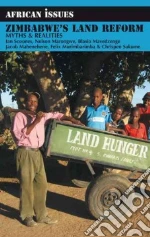 Title :
Zimbabwe's Land Reform
Title :
Zimbabwe's Land ReformAuthor: Scoones Ian, Marongwe Nelson, Mavedzenge Blasio, Mahenehene Jacob, Murimbarimba Felix Publisher: Boydell & Brewer Inc Ten years after the land invasions of 2000, this book provides the first full account of the consequences of these dramatic events. This land reform overturned a century-old pattern of land use, one dominated by a small group of large-scale commercial farmers, many of whom were white. But what replaced it? This book challenges five myths through the examination of the field data from Masvingo province: Myth 1 Zimbabwean land reform has been a total failure Myth 2 The beneficiaries of Zimbabwean land reform have been largely political 'cronies' Myth 3 There is no investment in the new resettlements Myth 4 Agriculture is in complete ruins creating chronic food insecurity Myth 5 The rural economy has collapsed By challenging these myths, and suggesting alternative policy narratives, this book presents the story as it has been observed on the ground: warts and all. What comes through very strongly is the complexity, the differences, almost farm by farm: there is no single, simple story of the Zimbabwe land reform as sometimes assumed by press reports, political commentators, or indeed much academic study. Ian Scoones, Professorial Fellow, Institute of Development Studies, University of Sussex, with co-authors Nelson Marongwe, Blasio Mavedzenge, Jacob Mahenehene, Felix Murimbarimba and Chrispen Sukume. Zimbabwe: Weaver Press Southern Africa: Jacana € 22,30
|
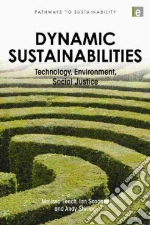 Title :
Dynamic Sustainabilities
Title :
Dynamic SustainabilitiesAuthor: Leach Melissa, Scoones Ian, Stirling Andy Publisher: Stylus Pub Llc Introducing a new pathways approach for understanding and responding to sustainability challenges, this title explores practical ways forward for building pathways to sustainability. € 159,40
|
|
2001 |
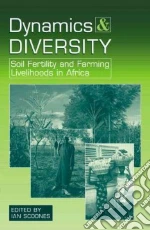 Title :
Dynamics and Diversity
Title :
Dynamics and DiversityAuthor: Scoones Ian (EDT) Publisher: Stylus Pub Llc Soils are critical to agriculture and, in turn, to food supply and livelihoods. Sustainable management of soils is crucial for a large proportion of the population of Africa. Contrary to many claims, soil fertility is improved and managed successfully by small-scale farmers there. Careful studies from widely different areas reveal how closely bound up soil management is with complex social, cultural and ecological factors - requiring a far more subtly tuned approach to development policy and practice. This work is a study of how the context of livelihood systems has to inform development policy and practice. € 37,10
|
|